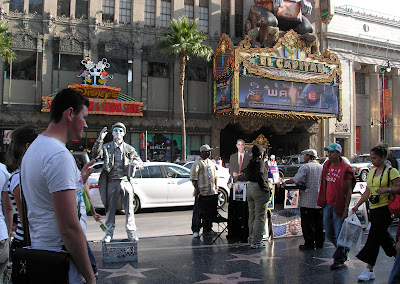
Aren't those kind of cute, in a way? An earthquake one day and a colonoscopy the next have put me in a mild and mushy mood. Of course the Demerol hasn't worn off yet, but instead of lingering in grief over the loss of two polyps nice young Dr. Zaidel found and snipped off while I was in LaLa Land, I'll just say that it's rather sweet to be all in one piece in our little perch on the hillside stretched out under our new prism-striped bedspread listening to the wind in the palm trees outside we call Fred and Ethel. Ted is lying here next to me for post-procedure companionship, and we're watching CNN and PBS and bitching about everything. We love Gwen Ifill but can't stand Roland Martin. Tired of Wolf Blitzer's voice. Like Campbell Brown, and respect Gloria Borger. Tired of hearing about the earthquake. Etc. Etc.
They were playing old Rolling Stone in the procedure room. I commented on it and the friendly "butt tech" kid said, "would you like to voice a preference?" I muttered I didn't think I'd be awake long enough to enjoy it. At that moment I was cold with last second anxiety and wondering why there was a digital readout up at the ceiling that read 00:00. What was that about? Time stops during colonoscopies? I wish I'd said, like, "yeah, Nick Drake" or something just to be cool.
A person is not cool while naked on a padded gurney with her butt crack exposed to the long hose with a tiny camera on the end. Think there's a chance I could get that on You-Tube? I seem to remember saying "ouch," "ouch" a couple of times, but when I opened my eyes I was done and back in the recovery room, still on my left side, hearing a lady holler, "I'm going to die, I'm going to die." I don't know if she did but I didn't, at least not yet.
Anyway, back to our airy aerie. Just as we were settling down to wait for my sobriety, the neighbors on two adjoining terraces below us got into a dustup over their back fences: She, of a round little body and beatup sunhats and a wonderful little patch of tangled and overgrown melon vines, tomatoes, beans and corn stalks started yelling "I know what you do when I'm not looking! You fucking reach over my fence and cut away my fucking bougainvilleas!" He apparently made the mistake of calling her honey, which prompted a fresh streak of blue from said lady gardener. "How fucking dare you? Who do you think you are?" We couldn't make out his abashed response. Ted and I love this hillside. Fights over bougainvilleas...it just makes me happy. She has two little dogs and plays solitaire on a card table under a dilapidated lean-to at night. I'm on her side.
First food after getting home: a nice slim ham and cheese sandwich.
New info: diverticulosis. Oh, lord, didn't they used to make fun of that on Saturday Night Live? Well, there's a tradeoff: another disease to gab about at parties. BINGO! My body is gifting me yet again: woo-hoo! A new way to bore my friends and establish my creds as an old dame.
The only treatment, according to a damp little handout they stuck into my clammy palms: what my mother called roughage. I can't imagine that I haven't eaten enough roughage -- it was the central item on my mother's Ohio menus. All hail roughage.
Off to sink back into dreamy land to Jim Lehrer's comforting voice while it lasts...and then Ted and I are repairing to the Think Cafe up in the strip mall for lots of...roughage.
























